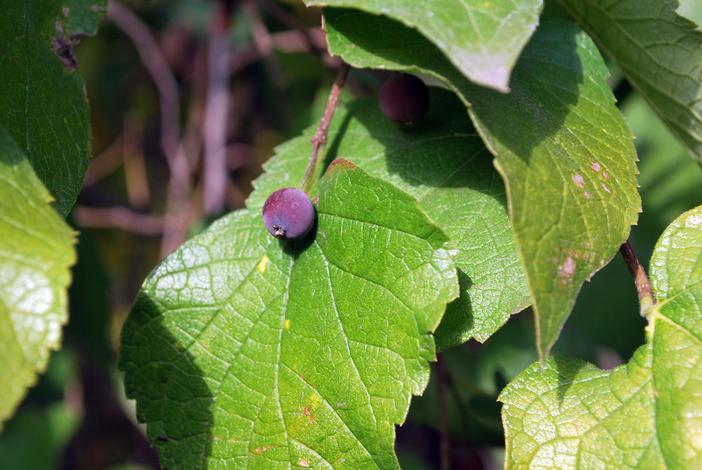Netleaf Hackberry
(Celtis reticulata)
Netleaf Hackberry (Celtis reticulata)
/
/

Bri Weldon
CC BY 2.0
Image By:
Bri Weldon
Recorded By:
Copyright:
CC BY 2.0
Copyright Notice:
Photo by: Bri Weldon | License Type: CC BY 2.0 | License URL: https://creativecommons.org/licenses/by/2.0/ | Uploader: briweldon | Publisher: Flickr






















Estimated Native Range
Summary
Celtis reticulata, commonly known as netleaf hackberry, is a deciduous tree native to a variety of habitats including riparian zones, canyons, and arid regions in the South Central and Southwestern USA, as well as Northern Mexico. It typically grows to a height of 6 to 9 meters (20 to 30 feet) and can reach a trunk diameter of 15 to 35 centimeters (6 to 14 inches). The tree often appears scraggly or stunted and may resemble a large bush, especially when found in less hospitable environments. Its growth habit is influenced by the altitude, which ranges from 500 to 1,700 meters (1,600 to 5,600 feet).
Netleaf hackberry is valued for its adaptability and resilience, making it suitable for urban planting and as a wildlife-friendly species. It features small, inconspicuous greenish flowers in the spring, followed by small orange to dark purple berries that attract birds. The tree’s bark is distinctive, with a corky and warty texture. In cultivation, netleaf hackberry is appreciated for its ability to withstand drought conditions once established, and it can thrive in full sun to part shade. It is tolerant of a variety of soil types, provided they have medium to fast drainage. While it does not have any major disease problems, gardeners should be aware of potential issues with witches’ broom, a disease that causes abnormal brush-like clusters of twigs.CC BY-SA 4.0
Netleaf hackberry is valued for its adaptability and resilience, making it suitable for urban planting and as a wildlife-friendly species. It features small, inconspicuous greenish flowers in the spring, followed by small orange to dark purple berries that attract birds. The tree’s bark is distinctive, with a corky and warty texture. In cultivation, netleaf hackberry is appreciated for its ability to withstand drought conditions once established, and it can thrive in full sun to part shade. It is tolerant of a variety of soil types, provided they have medium to fast drainage. While it does not have any major disease problems, gardeners should be aware of potential issues with witches’ broom, a disease that causes abnormal brush-like clusters of twigs.CC BY-SA 4.0
Plant Description
- Plant Type: Tree
- Height: 15-40 feet
- Width: 15-40 feet
- Growth Rate: Slow
- Flower Color: N/A
- Flowering Season: Spring
- Leaf Retention: Deciduous
Growth Requirements
- Sun: Full Sun, Part Shade
- Water: Medium
- Drainage: Fast, Medium
Common Uses
Bee Garden, Bird Garden, Butterfly Garden, Deer Resistant, Drought Tolerant, Edible*Disclaimer: Easyscape's listed plant edibility is for informational use. Always verify the safety and proper identification of any plant before consumption., Fire Resistant, Hummingbird Garden, Low Maintenance, Street Planting
Natural Habitat
Native to riparian zones, canyons, and arid regions within its range, from 500 to 1,700 meters in altitude
Other Names
Common Names: western hackberry , Douglas hackberry , netleaf sugar hackberry , palo blanco , acibuche
Scientific Names: Celtis reticulata
GBIF Accepted Name: Celtis reticulata Boorsma, 1907